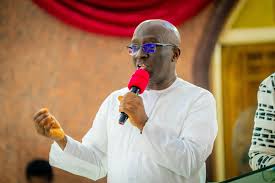A storm of controversy has broken out in Edo State following the decision by Governor Monday Okpebholo to return eight government-owned secondary schools to the Catholic Mission, a move that has triggered protests from several Muslim groups and community leaders. Critics argue that the decision lacks inclusivity and disregards the religious diversity of the schools’ students and staff.
Governor Okpebholo had, on Monday, June 16th, formally approved the return of the schools to the Catholic Diocese of Auchi, citing the historical origin of the institutions and the Church’s capacity for moral and academic leadership. The handover followed a meeting between the governor and Bishop Gabriel G. Dunia, with the schools involved including Our Lady of Fatima College in Auchi, St. Angela’s Grammar School in Uzairue, St. John Grammar School in Fugar, and several others across the state. While the government noted that schools currently under state renovation would remain under its supervision until completed, the broader decision has ignited widespread dissent.
Bishop Dunia praised the move as a long-awaited justice for the Church, noting that prior administrations had failed to respond to appeals for the return of mission-founded schools. He emphasized that the Church’s commitment extends beyond academics, describing its role as critical to nurturing a morally upright society.
But Muslim groups, led by Edo Muslims for Equity and Good Governance (EMEGG) and the Nigeria Council of Islamic Affairs (NSCIA), have condemned the move as one-sided and potentially discriminatory. In a joint statement signed by Sirajudeen Muhammad and Abdullah Umar, the groups acknowledged that some of the schools were originally founded by missionaries but insisted that many of the lands used were donated by predominantly Muslim host communities. They stressed that the development and maintenance of these schools over the decades have been funded by public taxes from both Muslims and non-Muslims.
The NSCIA Chairman in Edo State, Abdulaziz Igbinidu, warned that the decision poses a risk to Muslim students and teachers, particularly those already enrolled or employed in the affected schools. Igbinidu lamented that the handover was announced after significant government investment in rebuilding these schools, raising concerns about equity and the potential erosion of religious neutrality in public education.
The Edo North Council of Ulama added its voice through Chairman Zakariyah Musa, who decried the move as exclusionary. He argued that the governor failed to consider the welfare of Muslim constituents, many of whom occupy teaching positions and student slots in the affected schools. Musa hinted at an upcoming meeting between Muslim leaders and the governor, noting that the action risks being perceived as a marginalization of Muslims in a state where they already constitute a minority.
Similar sentiments were echoed by Imam Harun Umar of the Edo South Council of Ulama, who noted that while the governor might have been motivated by the desire to boost discipline and academic standards, broader implications were overlooked. He urged the government to pursue a more inclusive path to educational reform rather than what he described as a “narrow sectarian solution.”
Sado Mutairu Ibhafidon, Vice Chairman of the Edo Central Council of Ulama and a native of the governor’s local government area, expressed personal disappointment, revealing that he had supported the governor at personal risk during the elections. Ibhafidon criticized the decision for lacking popular consultation and warned that it could sow seeds of discontent, not only among Muslims but also among non-Catholic Christians.
He pointed out that returning the schools to a specific denomination could be misinterpreted as a political alignment, rather than a policy decision made in the best interest of educational development. He also urged Muslim appointees and political allies of the governor to engage him directly and convey the community’s grievances before the decision causes deeper divisions.
A five-man implementation committee has reportedly been set up to oversee the transition process. However, several Islamic leaders have emphasized that the committee must begin its work by engaging in wide-ranging consultations with stakeholders across religious and community lines. Until such engagements are held, calls have intensified for Governor Okpebholo to suspend the implementation of the decision.



